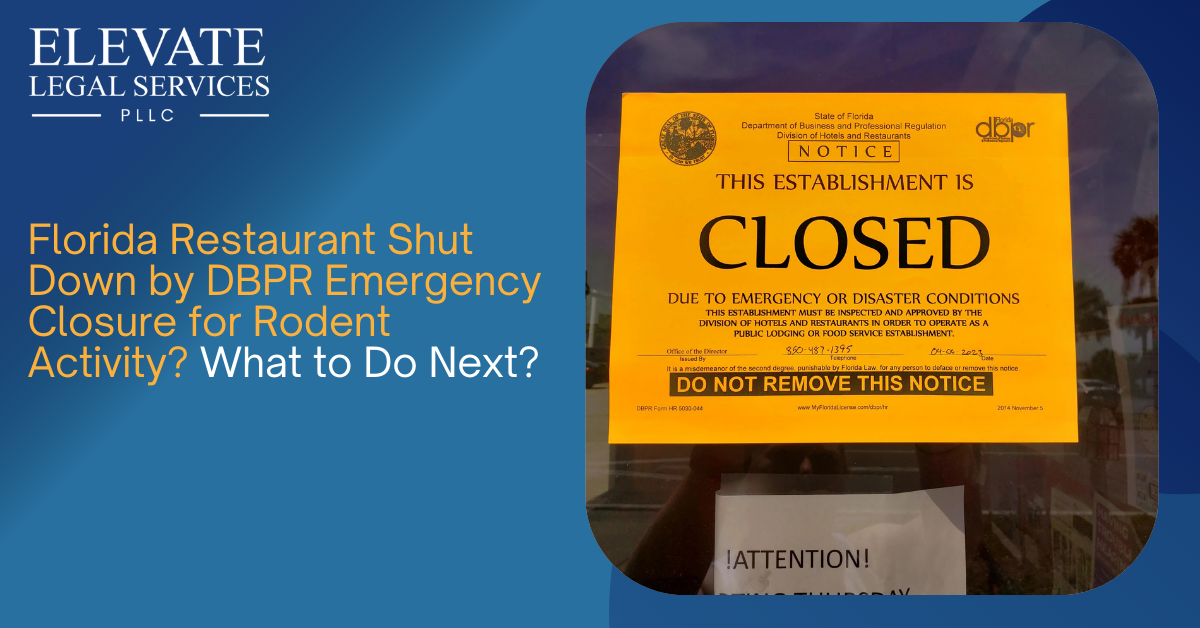
Running a Restaurant in Florida comes with many challenges, but perhaps one of the most damaging is facing an Emergency Closure order from the Florida Department of Business and Professional Regulation (DBPR). If your establishment has been shut down for rodent activity or unsanitary conditions, your business, reputation, and livelihood could be on the line. But there’s hope—and legal options to get you back on your feet quickly and in compliance.
At Elevate Legal Services, PLLC, we understand the emergency and seriousness of DBPR emergency closures. Based in Boca Raton, our law firm is dedicated to defending Florida restaurant owners and food service businesses in administrative law hearings and DBPR regulatory matters. We’ve helped numerous clients across the state reopen after shutdowns and clear their records.
Contact Elevate Legal Services, PLLC today at561-770-3335 or email [email protected] to schedule a confidential consultation. Early legal intervention can reduce your downtime and protect your business license.
Why Did DBPR Shut Down Your Restaurant?
Florida law gives the Division of Hotels and Restaurants, under DBPR, the authority to immediately shut down a food service establishment if inspectors determine there is a risk to public health. One of the most common reasons for an emergency closure is rodent activity—an issue that includes visible rodents, droppings, gnawed packaging, and evidence of nesting.
Other Common Reasons for Emergency Closures:
- Presence of cockroaches or flies in food prep areas
- Improper food storage or temperature control
- Sewage backups or overflowing grease traps

- Inadequate handwashing facilities
- Lack of proper pest control measures
Once DBPR finds these violations, they may issue an Emergency Closure Order under Chapter 509, Florida Statutes, and require immediate cessation of operations until the problems are corrected.
What Happens After an Emergency Closure?
The DBPR will post a public notice of the closure and list your establishment on their website as having been shut down for health violations. This notice is often picked up by media outlets or online databases, harming your reputation further.
However, emergency closures are not permanent, and swift legal action can reduce the long-term impact on your business.
Step-by-Step Guide to Responding to a DBPR Emergency Closure
Step 1: Understand the Inspection Report
The DBPR will issue a detailed inspection report outlining all violations found during their visit. Review this document carefully to identify the exact issues cited. Common language includes:
- “Rodent droppings observed in dry storage area”
- “Live rodents seen in kitchen prep area”
- “Food stored in contaminated conditions”
This report becomes the foundation for your response and remediation plan.
Step 2: Contact an Administrative Law Attorney Immediately
You need a legal team that understands DBPR procedures and can advocate for you effectively. Don’t submit a written or oral response without consulting an attorney.
Call Elevate Legal Services, PLLC at 561-770-3335 or email [email protected] for immediate legal assistance. We’ll help guide you through the process of reopening and challenging unfair citations if applicable.
Step 3: Correct the Violations Immediately
Hire a licensed pest control company to treat and remove the rodent infestation. Take the following steps to demonstrate good faith:
- Remove contaminated food products
- Deep-clean all food prep and storage areas
- Seal entry points for pests
- Improve food safety protocols and staff hygiene practices
Document every step taken with before-and-after photos, receipts, and pest control reports.
Step 4: Schedule a Re-Inspection with DBPR
Once all violations have been corrected, your attorney can help you schedule a follow-up inspection. DBPR inspectors will verify that your establishment is now in compliance and, if satisfied, will lift the emergency closure order.
Step 5: Respond to Any Administrative Complaint
In many cases, DBPR may also file an administrative complaint seeking further penalties or disciplinary action, including:
- Fines
- License probation
- Mandatory training or inspections
Your attorney can help you respond to the complaint, challenge inaccurate findings, and negotiate reduced penalties.
How an Attorney Can Help
At Elevate Legal Services, PLLC, we provide comprehensive legal support that includes:
- Reviewing the inspection findings and documentation
- Preparing and submitting corrective action plans
- Coordinating re-inspections with DBPR officials
- Challenging overreaching or incorrect citations

- Representing you in administrative hearings
- Helping restore your restaurant’s reputation
Whether you’re a single-location owner or operate multiple franchises, we tailor our legal services to meet your business needs.
Why Choose Elevate Legal Services, PLLC?
Elevate Legal Services, PLLC, has earned a reputation as one of Florida’s go-to law firms for restaurant license defense and DBPR administrative law.
Deep Knowledge of DBPR Regulations: We know the statutes and procedures DBPR uses and how to respond effectively.
Aggressive, Strategic Advocacy: We don’t just help you comply—we work to protect your rights and reputation.
Fast-Action Legal Support: We move quickly to reduce your business downtime and get your doors open again.
Proven Results: From lifting emergency orders to reducing penalties, we’ve helped dozens of restaurant owners protect their operations.
When your business is under threat, you need a legal partner who understands what’s at stake and knows how to win.
Final Thoughts
Having your Florida restaurant shut down by DBPR for rodent activity is a nightmare no business owner wants to face—but it’s a problem that can be fixed with the right legal help and rapid response. Don’t let a temporary issue become a permanent stain on your record.
Contact Elevate Legal Services, PLLC today at 561-770-3335 or email [email protected] to schedule your confidential consultation. We’re here to help you get back in business, protect your license, and defend your future.
Your reputation and livelihood are worth fighting for—and we’re ready to stand with you.





